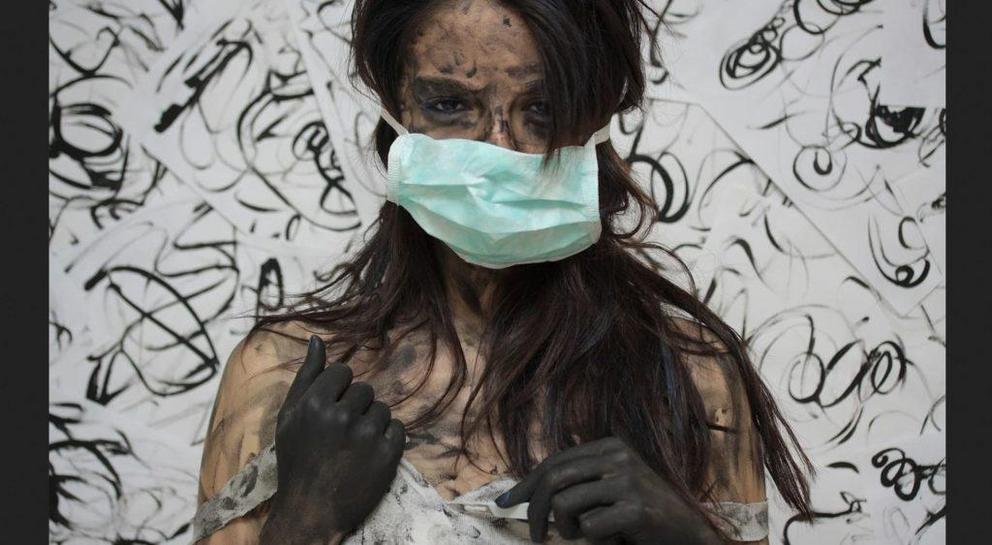It’s official: Your mask can harm you
The signs are up in so many places now:
“No Entrance Without a Face Mask.”
“Face Mask Required to Enter this Facility.”
“Face Mask Obligatory in this Store.”
As part of the new normal, people now regularly don the mask when venturing outdoors or even driving in their cars, as well.
But recent events have called into question the safety of some popular and widely distributed masks.
The Canadian government is now reporting that some masks distributed to day care facilities have been found to be laced with graphene and are being pulled out of circulation, due to concerns about the potential toxicity of graphene. Graphene is a product of nano-tech and is a form of carbon that consists of nanoscopically thin flakes of hexagonally-arranged carbon atoms.
According to the CBC, grey and blue masks which were given to children at these facilities potentially contain graphene. The specific masks in question were made in China and distributed by Métallifer, a Quebec-based company. The model of the masks has been delineated as SNN200642.
“If you have this type of mask in stock, we ask that you stop distributing them and keep them in a safe place now,” the provincial government said in its directive.
According to Health Canada, graphene is associated with “early pulmonary toxicity” in animal studies.
However, a quick check reveals that graphene is widely used in face masks, and certainly not only through the Quebecois distributor.
Amazon advertises multiple masks made with graphene. Vendors include companies ranging from Guangzhou Nanqixing Non woven Co., Ltd., in Guangdong, China to Pacsafe in Seattle, Washington.
At least one British company is in on the graphene act. Versarien is headquartered in Gloucestershire, UK. Its website proudly lists its multiple affiliates involved in graphene production, including Versarien Graphene Inc, based in Texas, which is the distribution arm for the UK’s graphene development technologies and Gnanomat S.L. based in the Parque Científico Madrid, Spain, “a company capable of utilising Versarien’s graphene products in an environmentally friendly, scalable production process for energy storage devices.”
Just a few days back, Medicevo Company sent out a press release concerning its graphene face masks, lauding its ability to filter out 98% of Covid virus.
According to Medicevo, “The masks are scientifically proven to kill COVID-19 particles and other types of infectious diseases like the seasonal flu, which is key for disease control and prevention.”
The problem, however, is that graphene has been known for some time to be potentially hazardous to humans, as well.
While being lauded as a “wonder material,” “miracle material,” and “supermaterial,” scientific papers dating back a number of years have noted that it appears to have pronounced health hazards.
In 2018, the journal Nanoethics stated that “Graphene is a nanomaterial with many promising and innovative applications, yet early studies indicate that graphene may pose risks to humans and the environment.”
The article goes on to state that “An especially notable study found that micrometer-thick sheets of a few graphene layers can penetrate cell membranes at the sheets’ corners and asperities, of which numerous exist along the irregular edges of fabricated graphene [30]. This piercing of cells illustrates the inherent potential of graphene to cause harm to organisms.”
A Chemistry World article dating back to 2012 stated that “once graphene enters the lungs the immune system has trouble getting rid of it” and went on to state that “Graphene nanoplatelets can penetrate deeper into the lungs than their size would suggest… And once there, the body’s natural defences cannot deal with them effectively. Chronic exposure could therefore lead to inflammation and disease in a similar way to asbestos fibres.”
Asbestos. Let that sink in. Your face mask, seen as so necessary to protect you from this virus that has a 99% survival rate, can result in the horrific lung damage seen with asbestos. And this has been known since at least 2012.
Neither Versarien nor Pacsafe nor Health Canada responded to requests for comment from this reporter.

